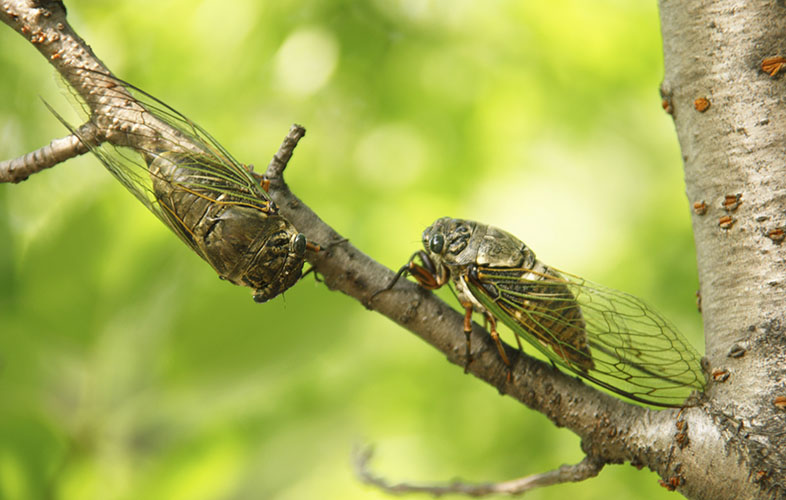2024’s Big Buzz: Preparing Your Yard for the Cicadas
One of the most fascinating natural phenomena is set to take stage across certain parts of the United States this year: the co-emergence of cicada broods XIX and XIII. Identified by roman numerals, cicada broods are a large, specific population of cicadas that emerge in the same geographic region. These cycles are a remarkable spectacle in the insect world and can result in massive numbers of cicadas—in this case up to one trillion—simultaneously emerging in affected areas.
Periodic cicadas, which live 13 or 17 years, spend most of their lives underground where they feed on tree roots throughout their five juvenile stages. The timing of their emergence is not random—they collectively emerge when the soil temperature reaches 64°F at a depth of 7-8 inches. In 2024, this is anticipated to occur in May or early June. What makes this event so noteworthy is the rarity of it, as the co-emergence of these two specific broods with different life cycles happens only once every 221 years. This year is the first year since 1803 this event has occurred, and it is not expected to happen again until 2245!
Will There Be Cicadas Near Me?
Although both cicada broods are expected to emerge simultaneously, this will not happen in the exact same regions. Their impact is also not nationwide, only affecting specific areas of the United States.
The 13-year brood XIX, which is also referred to as the "Great Southern Brood,” is anticipated to emerge across a swath of states including Alabama, Arkansas, Georgia, Illinois, Indiana, Kentucky, Louisiana, Mississippi, Missouri, North Carolina, Oklahoma, South Carolina, Tennessee, and Virginia.
The 17-year brood XIII, also known as the "Northern Illinois Brood,” will primarily affect areas in Illinois, while also extending into parts of Indiana, Iowa, Michigan, and Wisconsin.
Common Questions About Cicadas
Although cicadas are something most of us have heard of, there are still a lot of misconceptions or misunderstandings of what it means when they finally emerge. Understanding their behavior can help us appreciate their role in our ecosystem and better prepare us for their appearance.
Are cicadas dangerous?
Cicadas do not pose any harm to humans or pets. They do not sting or bite, nor are they poisonous. The sheer volume of cicadas can be startling for some people, and their deafening noise can be a nuisance. Males “sing” to attract females, and the loud buzzing or chirping sounds of millions of cicadas can be intense, reaching up to 100 decibels or more.
Why do I see holes in the ground?
Cicadas leave exit tunnels when they emerge from the ground as adults. These exit tunnels, which are roughly the size of a dime, are created as they tunnel their way to the surface. Once the cicadas emerge from these tunnels, the holes remain as evidence of this emergence.
Do cicadas eat grass?
Cicadas do not typically eat grass, but they will feed on the sap of trees and woody shrubs by piercing the bark with their mouths. This sap provides them with the nutrients needed during their relatively short adult lifespan, which is focused on mating and laying eggs. However, you may find small holes or areas of your lawn where sod has been lifted and where raccoons, skunks, opossums, birds, and foxes have searched for cicadas that are in their younger nymph stage.
Do cicadas damage trees?
Yes, female cicadas can cause damage to trees when they make small incisions into small, thin branches, where they deposit their eggs. These incisions can weaken the branches, particularly in smaller or younger trees, while healthy adult trees should remain unharmed. The weight of the egg-laden branches may also cause young, thin trees to droop or break. These eggs will hatch after 6-10 weeks, where they will then drop to the ground before burrowing deeper to feed on tree roots.
Are they harmful to the environment?
No! In fact, cicadas play a positive role in local ecosystems. They serve as a significant food source for birds, small mammals, and even some humans who like to cook and eat cicadas. After cicadas die, their bodies break down and release nutrients into soil, which can stimulate plant growth and development. This is why the use of insecticides during this period is discouraged, especially as it would be ineffective due to the sheer volume of cicadas.
How Homeowners Can Protect Their Property
Despite the buzz surrounding this event, the arrival of broods XIX and XIII is not something to fear as it does not pose a substantial threat to your property. With a little preparation, homeowners can make sure this once-in-a-lifetime lifecycle becomes more fascinating than frustrating. You can take several protective measures, such as:
- Adjust Planting Timing: Avoid planting new trees and shrubs just before the emergence. If you must, opt for larger plants with a trunk or stem diameter that is greater than 2.5 inches.
- Net Your Plants: Protect your landscape by securing netting around small plants and trees to prevent cicada damage.
- Manage Egg Laying: Regularly inspect and prune parts of your trees and shrubs where cicadas lay their eggs to minimize damage.
- Secure Entry Points: Make sure windows and doors are closed, and if your windows are open, ensure screens are intact to prevent cicadas from entering your home.
- Limit Your Lighting: Like most other bugs, cicadas are attracted to light, so minimize outdoor lighting during the peak to reduce their presence around your house.
When it comes to ensuring the strength and health of your trees and shrubs, proactivity is key. Our science-based Tree & Shrub Care plan includes targeted seasonal root zone fertilization, disease control, insect and mite control, and horticultural treatments. Stop problems before they start by getting a tailored TruGreen® plan that is designed to help protect your lawn and landscape.
References:
- https://extension.illinois.edu/blogs/good-growing/2024-02-22-cicadas-are-coming-periodical-cicadas-illinois-2024
- https://pdic.ces.ncsu.edu/2024/02/the-cicadas-are-coming-fear-not-though/
- https://www.uwlax.edu/
- https://blogs.cdc.gov/niosh-science-blog/2021/07/20/noise-myths-cicada/
- https://www.uwlax.edu/currents/cicadas-2024/

















